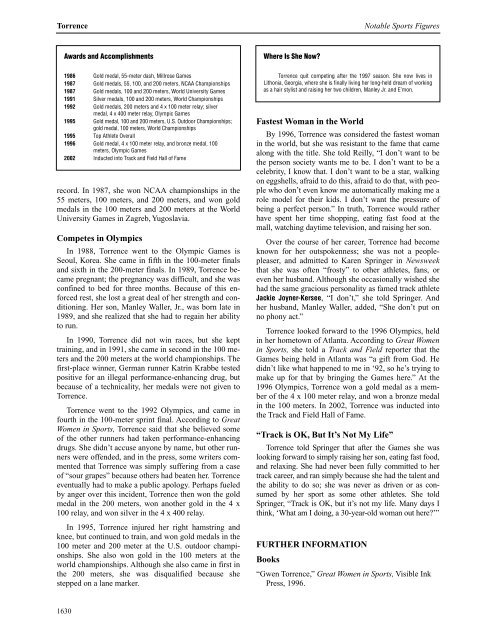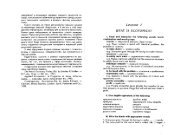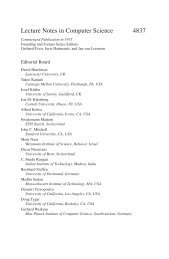Frank Thomas
Frank Thomas
Frank Thomas
Create successful ePaper yourself
Turn your PDF publications into a flip-book with our unique Google optimized e-Paper software.
Torrence Notable Sports Figures<br />
Awards and Accomplishments<br />
1986 Gold medal, 55-meter dash, Millrose Games<br />
1987 Gold medals, 55, 100, and 200 meters, NCAA Championships<br />
1987 Gold medals, 100 and 200 meters, World University Games<br />
1991 Silver medals, 100 and 200 meters, World Championships<br />
1992 Gold medals, 200 meters and 4 x 100 meter relay; silver<br />
medal, 4 x 400 meter relay, Olympic Games<br />
1995 Gold medal, 100 and 200 meters, U.S. Outdoor Championships;<br />
gold medal, 100 meters, World Championships<br />
1995 Top Athlete Overall<br />
1996 Gold medal, 4 x 100 meter relay, and bronze medal, 100<br />
meters, Olympic Games<br />
2002 Inducted into Track and Field Hall of Fame<br />
record. In 1987, she won NCAA championships in the<br />
55 meters, 100 meters, and 200 meters, and won gold<br />
medals in the 100 meters and 200 meters at the World<br />
University Games in Zagreb, Yugoslavia.<br />
Competes in Olympics<br />
In 1988, Torrence went to the Olympic Games is<br />
Seoul, Korea. She came in fifth in the 100-meter finals<br />
and sixth in the 200-meter finals. In 1989, Torrence became<br />
pregnant; the pregnancy was difficult, and she was<br />
confined to bed for three months. Because of this enforced<br />
rest, she lost a great deal of her strength and conditioning.<br />
Her son, Manley Waller, Jr., was born late in<br />
1989, and she realized that she had to regain her ability<br />
to run.<br />
In 1990, Torrence did not win races, but she kept<br />
training, and in 1991, she came in second in the 100 meters<br />
and the 200 meters at the world championships. The<br />
first-place winner, German runner Katrin Krabbe tested<br />
positive for an illegal performance-enhancing drug, but<br />
because of a technicality, her medals were not given to<br />
Torrence.<br />
Torrence went to the 1992 Olympics, and came in<br />
fourth in the 100-meter sprint final. According to Great<br />
Women in Sports, Torrence said that she believed some<br />
of the other runners had taken performance-enhancing<br />
drugs. She didn’t accuse anyone by name, but other runners<br />
were offended, and in the press, some writers commented<br />
that Torrence was simply suffering from a case<br />
of “sour grapes” because others had beaten her. Torrence<br />
eventually had to make a public apology. Perhaps fueled<br />
by anger over this incident, Torrence then won the gold<br />
medal in the 200 meters, won another gold in the 4 x<br />
100 relay, and won silver in the 4 x 400 relay.<br />
In 1995, Torrence injured her right hamstring and<br />
knee, but continued to train, and won gold medals in the<br />
100 meter and 200 meter at the U.S. outdoor championships.<br />
She also won gold in the 100 meters at the<br />
world championships. Although she also came in first in<br />
the 200 meters, she was disqualified because she<br />
stepped on a lane marker.<br />
1630<br />
Where Is She Now?<br />
Torrence quit competing after the 1997 season. She now lives in<br />
Lithonia, Georgia, where she is finally living her long-held dream of working<br />
as a hair stylist and raising her two children, Manley Jr. and E’mon.<br />
Fastest Woman in the World<br />
By 1996, Torrence was considered the fastest woman<br />
in the world, but she was resistant to the fame that came<br />
along with the title. She told Reilly, “I don’t want to be<br />
the person society wants me to be. I don’t want to be a<br />
celebrity, I know that. I don’t want to be a star, walking<br />
on eggshells, afraid to do this, afraid to do that, with people<br />
who don’t even know me automatically making me a<br />
role model for their kids. I don’t want the pressure of<br />
being a perfect person.” In truth, Torrence would rather<br />
have spent her time shopping, eating fast food at the<br />
mall, watching daytime television, and raising her son.<br />
Over the course of her career, Torrence had become<br />
known for her outspokenness; she was not a peoplepleaser,<br />
and admitted to Karen Springer in Newsweek<br />
that she was often “frosty” to other athletes, fans, or<br />
even her husband. Although she occasionally wished she<br />
had the same gracious personality as famed track athlete<br />
Jackie Joyner-Kersee, “I don’t,” she told Springer. And<br />
her husband, Manley Waller, added, “She don’t put on<br />
no phony act.”<br />
Torrence looked forward to the 1996 Olympics, held<br />
in her hometown of Atlanta. According to Great Women<br />
in Sports, she told a Track and Field reporter that the<br />
Games being held in Atlanta was “a gift from God. He<br />
didn’t like what happened to me in ‘92, so he’s trying to<br />
make up for that by bringing the Games here.” At the<br />
1996 Olympics, Torrence won a gold medal as a member<br />
of the 4 x 100 meter relay, and won a bronze medal<br />
in the 100 meters. In 2002, Torrence was inducted into<br />
the Track and Field Hall of Fame.<br />
“Track is OK, But It’s Not My Life”<br />
Torrence told Springer that after the Games she was<br />
looking forward to simply raising her son, eating fast food,<br />
and relaxing. She had never been fully committed to her<br />
track career, and ran simply because she had the talent and<br />
the ability to do so; she was never as driven or as consumed<br />
by her sport as some other athletes. She told<br />
Springer, “Track is OK, but it’s not my life. Many days I<br />
think, ‘What am I doing, a 30-year-old woman out here?’”<br />
FURTHER INFORMATION<br />
Books<br />
“Gwen Torrence,” Great Women in Sports, Visible Ink<br />
Press, 1996.

















